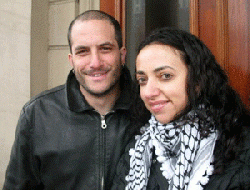University of Michigan graduate and human rights lawyer Huwaida Arraf has been a familiar face at many of the countless peaceful demonstrations in occupied Palestine and was also a participant on the original Gaza Freedom Flotilla, which landed her time in an Israeli prison.

|
| Huwaida Arraf (R) and Adam Shapiro. |
This past week, Arraf found herself in another prison about a thousand miles away from Jerusalem, as she was taken into police custody for recording demonstrators in Bahrain a few days ahead of the country’s one-year revolution anniversary and later deported along with a friend; six other Americans also were deported this week.
Arraf and Radhika Sainath, who recently launched the WitnessBahrain.org website and movement along with Arraf’s husband Adam Shapiro who had visited Bahrain in December, were officially charged with “participating in an illegal gathering,” and “engaging in activities outside the scope” of their tourist visas.
A gathering of five or more is illegal according to Arraf in the wake of mass pro-Democracy protests last year that were met with gruesome violence as well as torture, even at a hospital that had been treating protesters.
But Arraf and Sainath were merely videotaping and otherwise recording protests among the natives, she said, not actively participating. Their mission was the first official one for the new initiative, during which six other citizens of the U.S. were also arrested on Tuesday and scheduled to be deported, and was aimed at providing more international witnesses in the country as demonstrators prepare to reclaim the symbolic Pearl Roundabout that had became Bahrain’s version of Egypt’s Tahrir Square and a symbol of pride for the country.
Currently, both the Roundabout and the main hospital in Bahrain that was the site of alleged torture and violence against doctors treating demonstrators, Salmaniya are blocked by government forces.
The hospital is now subject to checkpoints controlling the flow of who goes in and out while the Roundabout is barricaded off, Arraf said. Despite that, demonstrators planned to make an attempt to reclaim it as part of the anniversary of the movement.
“Spirits remained high, I attended some gatherings that had thousands of people coming out, listening to speeches attentively, and they were well organized,” Arraf said.
“Everyone was planning to return to the Roundabout and it was all over Facebook and Twitter.”
During one of the demonstrations Arraf attended, government forces began shooting tear gas canisters at high speed, as well as at head level, which can be deadly. In Palestine, demonstrator Mustafa Tamimi was killed when he was struck with such a canister at close range in December.
Arraf said a similar canister whizzed by her head at one point during the demonstration but luckily no one was struck as troops continued to fire into crowds from all angles.
She also saw an 11-year-old boy snatched by police and when she questioned them as to why he was taken and what would happen with him, she did not receive an answer.
Others were “terribly gassed” for demonstrating during her time there, but the locals pitched in, with most of them having overcome their fears since last February as they remain committed to the revolution.
“Almost a whole village was gassed but the women would say ‘Here, come in there house,’ they would have the vinegar ready to treat them, there was a huge participation of very strong women sometimes more than man.”
She said that the sense of unity and pride among the people regardless of their religious affiliations, practices or sects was a beautiful surprise contrary to some reports that have played up sectarian discord.
“The scope of their demands might seem different, but they maintain amazing unity and respect or each other and that’s something that is very powerful coming from a lot of experience in Palestine where there are unfortunately a lot of divisions.”
Arraf and Sainath were later aggressively taken and strapped to chairs in an airplane in the early morning hours despite their sicknesses; Arraf was severely dehydrated while Sainath was throwing up from tear gas exposure.
The story did manage to make it to CNN.com, the L.A. Times and others, a bit of a surprise considering the mainstream media’s ignorance of issues in the country.
While it has long seemed as Bahrain’s screams of agony and shouts of frustration have gone unnoticed, the United States’ recently-proposed arms deal has been delayed because of awareness of the human rights abuses in the country.
In America, a letter was circulated by the office of Rep. Jim McDermott (D-Wash.), and is also signed by John Conyers (D-Mich.), Sen. Ron Wyden (D-Ore.) and Reps. Keith Ellison (D-Minn.), Donald Payne (D-N.J.), Lynn Woolsey (D-Calif.), Mike Honda (D-Calif.), James McGovern (D-Mass.), Jim Moran (D-Va.), Trent Franks (R-Ariz.) and John Carter (R-Texas) urging reconsideration that may have played a role in the delay of the sale. White House spokeswoman Victoria Nuland said on Monday that there was no timetable on when to move ahead with the proposed $53 million sale, although rights observers are keeping a close eye on the situation.
Arraf stressed the need for continued observation through the Witness Bahrain website, social media, calling and emailing elected officials and more.
“We have to keep putting pressure on governments to sanction Bahrain and all these kinds of abusive regimes,” she said. “When they are isolated and not doing business as a usual member of the international community it has a big effect and they realize they won’t be able to survive if they keep doing what they’re doing.”
She believes that the people’s strength will eventually lead to real change.
“(The peoples’ spirits) are very uplifting, maybe it’s my optimism speaking but I believe they will prevail.”






Leave a Reply